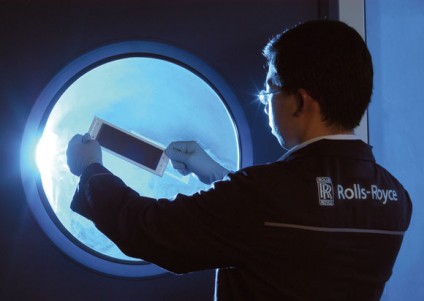Rolls-Royce Fuel Cell Systems Limited
Sustainable Technologies

Description and aims
Building sustainability into the life cycle of fuel cell systems
Compared with conventional combustion-based technologies, the environmental benefits of fuel cell systems in operation are widely accepted. But providing clean and efficient electrical power is only one phase of a fuel cell system’s life cycle. The full life cycle must also consider the environmental impacts of materials production, manufacturing processes and end-of-life management.
About Rolls-Royce Fuel Cell Systems Limited
Rolls-Royce Fuel Cell Systems Limited (RRFCS) is developing megawatt-scale stationary power generation systems using solid oxide fuel cell technology to provide clean and efficient electrical power.
To help the company achieve its goal, RRFCS is engaged in a three-year project with Loughborough’s Centre for Sustainable Manufacturing and Reuse / Recycling Technologies (SMART), working together to develop and implement a decision support system and strategy to optimise fuel cell sustainability throughout the life cycle of stationary power generation applications.
How the project is being undertaken
The project started with a comprehensive review of product-focused environmental legislation, in line with the company’s global market aspirations. Legislation relevant to all life cycle stages was identified, with comparisons drawn between Europe, North America and Asia.
The review developed a broad, fundamental understanding of this new and developing area of legislation, from which an evaluation of the product design could be carried out. Key environmental aspects were identified and drawn together in an Environmental Procedures Manual – a tool which can be used by designers and engineers throughout RRFCS to promote a pro-active approach to maintain and extend the company’s high environmental standards.
‘Our next stage is to understand how Rolls-Royce Fuel Cell Systems Limited can move beyond compliance to develop and demonstrate excellence with respect to sustainable practices. We are now completing an eco-design study, using life cycle assessment as a tool to model the environmental impacts of the product life cycle in order to identify the most significant contributions and inform future design and process improvement. The tool also allows different design, manufacture, use and end-of-life scenarios to be compared, which will enable future product development decisions to include consideration of the associated environmental impacts.’
Dr Shahin Rahimifard, Centre Director of SMART, Loughborough University
Impacts and benefits
‘As a company focused on the development of a new product that offers significant environmental advantages compared to current incumbent technology, it is essential that the benefits extend throughout its life cycle. The knowledge gained through the collaboration will continue to shape the design of our future products. Working in partnership with SMART to exploit its expertise and embed a researcher within the business has enabled us to better evaluate and strengthen our design process to meet the challenge of delivering environmentally sustainable products.’
Leighton Jones, QHS&E, Rolls-Royce Fuel Cell Systems Limited
For more information about the project
If you would like to hear more about this project, please contact Kathryn Burchell, Enterprise Office, Loughborough University
Email: k.d.burchell@lboro.ac.uk
Telephone: 01509 228493
University
Academic Lead
Dr Shahin Rahimifard
Centre for Sustainable Manufacturing and Reuse / Recycling Technologies (SMART)
Contact
01509 228493